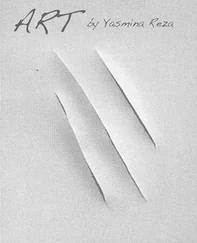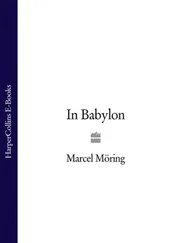Ясмина Реза - Babylon
Здесь есть возможность читать онлайн «Ясмина Реза - Babylon» весь текст электронной книги совершенно бесплатно (целиком полную версию без сокращений). В некоторых случаях можно слушать аудио, скачать через торрент в формате fb2 и присутствует краткое содержание. Год выпуска: 2018, ISBN: 2018, Издательство: Seven Stories Press, Жанр: Проза, на английском языке. Описание произведения, (предисловие) а так же отзывы посетителей доступны на портале библиотеки ЛибКат.
- Название:Babylon
- Автор:
- Издательство:Seven Stories Press
- Жанр:
- Год:2018
- ISBN:9781609808334
- Рейтинг книги:3 / 5. Голосов: 1
-
Избранное:Добавить в избранное
- Отзывы:
-
Ваша оценка:
- 60
- 1
- 2
- 3
- 4
- 5
Babylon: краткое содержание, описание и аннотация
Предлагаем к чтению аннотацию, описание, краткое содержание или предисловие (зависит от того, что написал сам автор книги «Babylon»). Если вы не нашли необходимую информацию о книге — напишите в комментариях, мы постараемся отыскать её.
Babylon — читать онлайн бесплатно полную книгу (весь текст) целиком
Ниже представлен текст книги, разбитый по страницам. Система сохранения места последней прочитанной страницы, позволяет с удобством читать онлайн бесплатно книгу «Babylon», без необходимости каждый раз заново искать на чём Вы остановились. Поставьте закладку, и сможете в любой момент перейти на страницу, на которой закончили чтение.
Интервал:
Закладка:
“Yes.”
“Let’s go to bed.”
“Yes . . .”
Jean-Lino’s little bouquet of mauve roses was jammed into a glass of water on the edge of a bookshelf. I hadn’t even bothered to take off their string. I looked for another vase and in the end I put them into a perfume flask. When he and I visited the aunt in her rest home, Jean-Lino had bought a bouquet of anemones. He told me, “You give them to her.” I held the bouquet as I stood in a corridor waiting for the aunt. There were wooden railings along either side, a woman was walking backward with a cane and thick pressure stockings. The aunt had appeared with her walker and charged right toward the cafeteria. I presented the flowers awkwardly, the aunt had no interest in cut flowers from Paris; they stayed behind in the commons room. Now I set the perfume flask on the coffee table. The roses seemed fake. The whole arrangement in that stained crystal vase had the look of an ornament on a gravestone. Or maybe it was just a sense of anomaly because of the hour and the situation. What was JeanLino doing all alone up there? Pierre called to me from the bedroom. I said, “I’m coming” . . . How could we have left him there?
He had taken Pierre and me to the Courette du Temple, one of those cafés that become jazz clubs three times a week. He had organized everything—that is, arriving a half hour ahead of the show, in a room nearly empty except for the musicians at the bar. Wall speakers played standards over an array of small round tables. Jean-Lino, dressed all “casual,” had seated us practically on the edge of a tiny stage holding a piano, a bass, and drums. We said “So close?” But he wanted us to see Lydie without the obstruction of a pillar or other spectators. I think, rather, that he needed to assert his place each time, his inaugural location. He immediately greeted the owner, made the introductions as an insider, ordered three drinks without asking our choice. People gradually arrived, people of all ages, in unfashionable outfits. I remember one fellow with silver-dyed hair tied into a tall do, coming and going in a jacket with a sheepskin collar over a red shirt. Some people wrote their names on a slate that hung from a mike stand; they were signing up (to perform) for the jam session, Jean-Lino explained. Lydie arrived glowing and effervescent, rushing to sign the schedule slate even before she came to join us. At first the musicians played on their own, then the trumpeter sang “I Fall in Love Too Easily.” I mused that it had been a long time since I fell in love easily , and it was also a long time since I had sat with a bunch of strangers in that seedy heat. After that, the singers came onstage carrying their sheet music. We clapped nicely no matter the performance. Jean-Lino was the biggest applauder. A woman in a polka-dot dress completely wrecked “Mack the Knife” in German; the man with the sheepskin collar (my favorite, I still think about him), introduced by the trumpeter as “Greg,” launched into a song he’d written himself. Gestures of rejection, caressing the mike, nods of quiet approval for the trumpet’s occasional contributions—he was meeting the world head-on and alone, the shiny silver helmet just a foot or two from us. Jean-Lino clapped hard, Lydie quivered with empathy. She knew him, a regular, in real life he was a ticket collector on the SNCF. She was applying fresh lip gloss when the trumpeter announced, “And now, we’ll hear . . . Lydie!!” Jean-Lino turned toward Pierre, with whom he’d never made any particular connection, and gripped his shoulder. He was red, maybe from the liquor, or stage fright, or a swell of pride that also had him scanning the audience to assess the level of concentration. Lydie began “Les Moulins de mon coeur” in an intimate tone, her voice nearly a murmur, before filling her lungs for the “anneau de Saturne” and the “ballon de carnaval.” In the full-front spotlight, the wild cap of curls and the sparkling earloops glittered. She had a delicate voice whose timbre sounded young to me, its inflections slightly naïve against her physical figure and the sense of harsh energy she gave off. She sang “Les Moulins de mon coeur” without drawing out the words, like a simple country song heard along the road, not meant to go anywhere, just to pass the time. This was an odd girl, someone you might have run across in a very different place and time. You had to see Jean-Lino. In the grip of joy, nearly risen off his chair. She didn’t look at him. Maybe didn’t care about him. She sang the words of abandonment with a child’s lightness—the bird tumbling from the nest, footprints fading—as she rocked from foot to foot, setting her bracelet’s charms swaying, living the moment to its depth with a regal imperturbability. JeanLino, leaning forward, watched over his idol with his body straining, expecting nothing in return. At one point he sensed me observing him and he straightened up as if caught in some misstep, smiling happy and embarrassed. To save face he snapped a photo of Lydie from the telephone set on the table, a quick one, not bothering with framing, his enchantment so pure he never supposed any need for it. We clapped noisily, the three of us. I knew Pierre was bored but he joined in politely. It seemed to me that the other customers appreciated Lydie too. She stayed at the mike awhile, lingering, taking her time before giving over her place, unlike the other performers, who had fled timidly the minute they were done. Before he went out for a smoke, Jean-Lino ordered four glasses of Saint James rum. Pierre had sent me a few desperate signals that made me giggle. Lydie came back to her seat in full bloom, fanning her low neckline. The trumpeter was saying, “And now we’ll hear . . . Jean-Jacques!!” It was a good-hearted evening fated for forgetting, just one in the flow of life’s numberless evenings.
That place, the Courette du Temple, seems distant now— the woman in the polka-dot dress, the man who thought he could play “Fly Me to the Moon” on the harmonica. The four of us, drunk on the sidewalk, crowding into and then thrown out of a cab that was already occupied. A man who’d been among the first to perform asked me, “You come here often?”
“First time.”
“The first time, people don’t dare.”
The past falls apart so quickly! It turns to chalk and crumbles like the Wall of the
Forgotten. I often think of the San Michele cemetery in Venice. We visited there, Pierre and Bernard and I, nearly alone one foggy November day. San Michele, an endless maze of enclosures, cells, plots, fields. An entire island of tombs. The walkways in the columbarium: whole walls of photo portraits bristling with jutting flasks of artificial flowers. Hundreds of photos of people dressed in their best, tidily coiffed, smiling gaily. We’d got lost there, wandering vaguely about seeing nobody else. It was lunchtime, midweek. On one tombstone there was this inscription: You will be with us always, Love, your Emma. I was struck by the nerve of the phrase. As if certain people remained eternally on earth. As if the two worlds should go on separately. In the urns section there was that Wall of the Forgotten. A dingy gray surface. The names and dates on it were nearly obliterated. You could still read “1905” on one of the clearer plaques. No photo, nowhere—there was nothing, just one or two clumps of porcelain flowers jutting from a crack in the slab. These people were no longer with anyone in our world. The black-and-whitish coloring of that wall—I see it as the very color of the past. From the minute you set foot on earth you must give up any idea of permanence. Near the Rialto bridge, on that same foggy day, Pierre bought me a short cashmere cape, brown and blue. I’d spotted it on a dummy in the window of a poorly lit shop. The door was hard to open and the man who came to help us had a half-paralyzed arm. An enormous counter ate up the whole interior. On the walls, shelving held merchandise, almost all of it wrapped in bundles. With his good arm he drew from a drawer several capes of different colors in their transparent slipcases. None was the same nice match of colors. When he understood that he would have to get down the one from the shopwindow, he grumbled something toward the rear of the shop. A woman arrived, no more cheerful than he, her head sunk between her shoulders, dressed as if she were outdoors (it was chilly in the shop). She moved a stool to reach into the vitrine and set about undoing the pins that attached the cape to the figure. I tried on the cape at a mirror where you couldn’t see a thing. I turned toward the men. Pierre thought it wasn’t bad. Bernard thought it looked a bit matronly. The couple said absolutely nothing. They seemed old and uninterested. We bought the cape, very inexpensive. The woman folded it carefully and put it in a pretty slipcase, which I still have, with Cashmere Made in Italy printed on it. They evinced no pleasure from the sale, which might have been the only one all day. They must have been there for years, seen their clientele thin out little by little, the elegant inhabitants of the neighborhood leaving town or dead. When they themselves go, Chinese shopkeepers will take over the place and sell handbags. The same colored leather bags hanging on display everywhere in the city. Or else an ice cream parlor, with super-harsh neon lighting. Or else, although not very likely, some young folks will open a dress shop. But the dress shop is part of the same transitory world as the handbags. The disagreeable couple belonged to a slower human race. I say slower, not more enduring.
Читать дальшеИнтервал:
Закладка:
Похожие книги на «Babylon»
Представляем Вашему вниманию похожие книги на «Babylon» списком для выбора. Мы отобрали схожую по названию и смыслу литературу в надежде предоставить читателям больше вариантов отыскать новые, интересные, ещё непрочитанные произведения.
Обсуждение, отзывы о книге «Babylon» и просто собственные мнения читателей. Оставьте ваши комментарии, напишите, что Вы думаете о произведении, его смысле или главных героях. Укажите что конкретно понравилось, а что нет, и почему Вы так считаете.

![Ясмина Сапфир - Охотница и чудовище [СИ]](/books/35157/yasmina-sapfir-ohotnica-i-chudoviche-si-thumb.webp)
![Ясмина Реза - Бог резни [=Бог войны]](/books/63616/yasmina-reza-bog-rezni-bog-vojny-thumb.webp)
![Ясмина Реза - Бог войны [=Бог резни]](/books/63617/yasmina-reza-bog-vojny-bog-rezni-thumb.webp)








